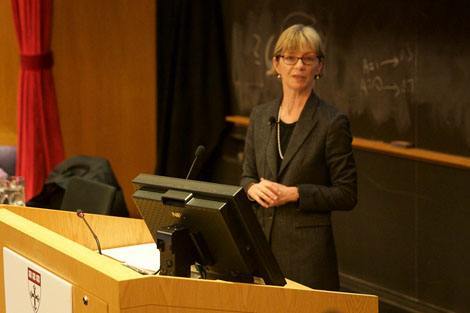February 16, 2016 — Massachusetts Secretary of Health and Human Services Marylou Sudders encouraged an audience of students at Harvard T.H. Chan School of Public Health to consider public service at some point in their careers. A veteran mental health administrator and child protection advocate, Sudders spoke about the challenges and rewards of promoting health through public policy, and the issues she faced during her first year in her current role.
Sudders’ talk, held February 10, 2016, in Kresge G-1, was sponsored by the School’s Women in Leadership student organization.
She began her remarks by thanking Harvard Chan faculty members John McDonough, professor of the practice of public health, Howard Koh, Harvey V. Fineberg Professor of the Practice of Public Health Leadership, and Nancy Turnbull, associate dean for professional education and senior lecturer in health policy, all of whom she has worked with in various capacities. Sudder praised the three as “heroes” for their research and advocacy, adding, “I have borrowed heavily from their work.”
Appointed by Governor Charlie Baker in January 2015, Sudders leads the largest executive agency in state government, with a $19.4 billion state budget and 22,000 employees. Services under Sudders’ leadership touch almost one in six Massachusetts residents.
Before she could tackle the range of issues she hoped to address, including opioid addiction, child welfare, and homelessness, Sudders’ first priority was to rein in the growth of the state’s Medicaid spending. She undertook efforts to restructure the state’s MassHealth program, moving toward what she called a more patient-centered and accountable system of health care. She said that she is implementing short-term fixes now that will lead to long-term stability.
“If we manage care well, we will manage costs,” she said.
Sudders spoke with pride about the state’s new law ending the practice of civilly committing women with addictions to a state prison for detox services. This change demonstrates that “as a public servant, you can make some things happen,” she said.
Photo: Sarah Sholes
